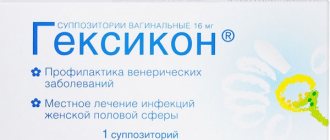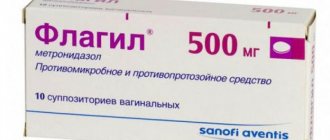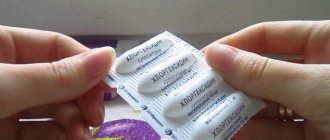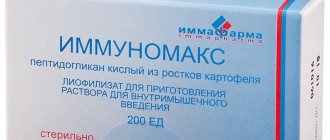- December 12, 2019
- obstetrics and gynecology
- Svetlana Saksina
In gynecology, Clindacin suppositories, instructions for use of which will be discussed in this article, are used to treat bacterial vaginosis. We invite you to familiarize yourself with the composition, method of use, side effects and other information about the drug. Analogues of the product and reviews left by patients about Clindacin suppositories will also be considered.
Compound
Each suppository contains 100 mg of the active substance - clindamycin. An auxiliary component is suppotsir (the basis for the production of candles).
Clindamycin suppositories are a medication intended for vaginal use.
pharmachologic effect
The suppositories have a bacteriostatic effect: the active substance suppresses the growth and reproduction of pathogenic microflora, blocking the production of microbial cell proteins. The drug is effective against staphylococci, streptococci, ureaplasma, clostridia, mycoplasma and a number of other microorganisms.
Pharmacokinetics
Systemic absorption is no more than 5%. The half-life is 1.5-3.5 hours, but in patients suffering from kidney pathologies, this time increases. Excretion is slow - about one week.
Pharmacokinetics
Clindacin B prolong (3 applicators are identical and have the same length and width) is complex and consists of 2 active components. The first active ingredient (butoconazole) is absorbed into the surface at about 1.7% of the applied dosage. The maximum concentration is observed after 13 hours. The active substance undergoes metabolic processes and is excreted from the body through the renal system and intestines.
The absorption concentration of the second main component (clindamycin) is about 4% of the administered dosage. In this case, the maximum concentration is reached after 10 hours. The ingredient tends to gradually accumulate. When using the drug in the treatment of bacterial vaginosis, the absorption rate of the main substance is about 4%. The maximum concentration of the component is achieved after 14 hours.
The effectiveness and therapeutic effect of the ingredient is less pronounced than when administered systemically or intravenously. The half-life of the component varies from 1.5 to 2.5 hours. When the medication is reused, the main substance does not accumulate. According to available data, there is no difference between young patients and women over 65 years of age.
How to take Clindamycin suppositories
The suppository is introduced after performing hygiene procedures.
- You must wash your hands thoroughly;
- remove the suppository from the package;
- lie down and insert the suppository into the vagina as deeply as possible, but so as not to experience discomfort;
- After this, you need to lie down for at least half an hour to allow the components of the drug to be absorbed and begin to act.
It is best to carry out treatment procedures before bedtime.
The recommended dose for adults is 1 suppository per day. The duration of treatment is from 3 days to a week.
If no therapeutic effect is observed, then you should consult a doctor. The specialist may recommend a higher dosage or suggest taking a repeat course. It is possible that the causative agent of the disease was identified incorrectly. In this case, the doctor will prescribe another drug.
For diabetes
The instructions do not contain any special instructions regarding the treatment of patients with diabetes mellitus with Clindamycin. When visiting a gynecologist, it is recommended to inform him about your diagnosis so that the doctor can select the most suitable drug.
Instructions for use, dosage
The drug is used only for intravaginal administration according to the regimen prescribed by a specialist. The patient first sees a doctor and undergoes an examination to identify the exact cause of the inflammation.
The duration of the therapeutic course depends on the characteristics of the disease and the presence of associated complications. In most cases, the course lasts from 3 to 6 days. During this period, the patient inserts 1 suppository deep into the vagina every day before bed. It is important to take a comfortable position.
Experts recommend that when inserted, lie on your back with your legs apart and bent at the knees. After administration, it is recommended to remain in a horizontal position for 1 hour, which will allow the active ingredient to have the most pronounced effect.
If necessary, the course of therapy can be extended to 7-10 days, but only according to indications and in the absence of negative reactions. Exceeding the dosage and duration of use on your own is strictly prohibited. Improper use in most cases provokes the development of complications.
Side effects of Clindamycin suppositories
The drug is well tolerated by patients. In rare cases, disruption of the menstrual cycle, irritation of the mucous membrane of the external and internal genital organs, and discharge of mucus from the vagina are possible. Side effects from other organs and systems are possible.
From the musculoskeletal and connective tissue side
With vaginal use of Clindamycin, no side effects from the musculoskeletal and connective tissue are observed.
Gastrointestinal tract
Abdominal pain and cramps, nausea and vomiting, diarrhea.
Blood-forming organs
Decreased leukocyte levels in the blood, neutropenia, eosinophilia, thrombocytopenia, agranulocytosis.
central nervous system
Dizziness, headache.
Allergies
Itching, rashes, redness of the skin.
Impact on the ability to operate machinery
The use of suppositories does not affect the ability to drive a car or engage in activities that involve complex machinery.
special instructions
During the treatment period, vaginal discharge increases, so women are advised to use panty liners. You should not use suppositories during menstruation: you must wait until the end of menstruation and then begin treatment.
Doctors advise avoiding sexual intercourse while using candles. But if this cannot be avoided, then you should remember that clindamycin reduces the strength of latex products - condoms and vaginal diaphragms, so the use of these means of protection during therapy is not recommended.
Use in old age
If suppositories are prescribed to patients over 60 years of age, then treatment is carried out under the strict supervision of a doctor.
If suppositories are prescribed to patients over 60 years of age, then treatment is carried out under the strict supervision of a doctor.
For children
Candles are not prescribed for children.
Use during pregnancy and lactation
During pregnancy and breastfeeding, suppositories can be prescribed by a doctor only if the expected benefit to the woman outweighs the possible risk to the development of the fetus or the health of the newborn.
Contraindications
Despite its high effectiveness, the medication is not always approved for use. Absolute contraindications include intolerance to the components of the composition or a tendency to allergic manifestations in the patient's history. If you have used a medication based on the same active substance in the past and developed negative reactions, you should refuse treatment.
If the use of the drug is necessary, the risk of complications should first be eliminated. Contraindications include the 1st trimester of pregnancy, as well as the lactation period. The official instructions warn that lactation is not considered an absolute contraindication to therapy, but experts rarely prescribe suppositories during this period in order to eliminate the risk of negative reactions in the child.
The medicine is not prescribed if you are allergic to antibiotics from the lincomycin group, since the active substance belongs specifically to this group. The medicine is prescribed with caution for severe liver and kidney failure, as well as for malignant neoplasms of the reproductive system.
For patients during menopause, the drug is also prescribed with caution, which is associated with the presence of a risk of developing dry mucous membranes. During menopause, the condition of the vaginal tissues deteriorates significantly, so additional dryness only aggravates the symptoms. In each case, a preliminary consultation with a doctor is required in order to prevent the development of complications.
Interaction with other drugs
During therapy with Clindamycin in the form of suppositories, it is necessary to avoid douching, irrigation of the vaginal mucosa, and the use of antiseptics. These procedures reduce the therapeutic effect of the drug.
You cannot use suppositories and drugs with erythromycin, calcium, magnesium sulfate at the same time, as the risk of side effects increases. The same applies to barbiturates.
Alcohol compatibility
It is better to avoid alcoholic beverages while using suppositories.
Additional Information
It is not recommended to combine the use of the drug with other intravaginal agents. Also, it cannot be used in the treatment of medications that contain magnesium sulfate, calcium gluconate, aminophylline, barbiturate, diphenylhydantoin, ampicillin, erythromycin.
Clindacin suppositories do not affect the speed of psychomotor reactions and concentration, therefore, during treatment it is not prohibited to drive a car or operate other complex mechanisms.
With prolonged use of suppositories, excessive growth of microorganisms that are insensitive to the effects of the active substance is possible, in particular fungi of the genus Candida.
The shelf life of the drug is three years. It should be stored in a dry place, away from direct sunlight, at a temperature of 15-25 degrees.
Analogs
Clindamycin is available in several dosage forms. All drugs have the active ingredient clindamycin. This:
- capsules for oral use - 150 mg of active substance;
- topical cream - 2%, sometimes incorrectly called ointment (more details in this article);
- injection solution - 300 mg of clindamycin in one 2 ml ampoule.
Analogs of suppositories are:
- Zerkalin - solution for external use;
- Clindamycin B Prolong - cream for vaginal use with two active ingredients - clindamycin, butoconazole;
- Dalatsin gel;
- Milagin - suppositories for vaginal use.
A cheaper analogue is Klimitsin suppositories.
Clindamycin price
| Release form | Price, rubles |
| Vaginal cream, 2%, 20 g | 258-429 |
| Vaginal cream, 2%, 40 g | 365-575 |
| Vaginal suppositories, 3 pcs. | 396-545 |
The army is advancing. There is a huge battle ahead. The enemy is strong and dangerous, but the antimicrobial drug is also good. Deadly acute - has a negative and rapid effect on microbes. Convenient (everything is thought out to the smallest detail). Relatively safe (in clumsy hands and with a dull knife you can get hurt). And against this background, the price of Clindamycin looks great.
Totally inexpensive. But this applies to tablets. If you look closely, the candles and cream are a little more expensive. But even so, the cost is quite reasonable, especially when you consider the power and efficiency. A drug that can solve a lot of problems with poor health deserves the money indicated on the price tag.
Regardless of the option (be it tablets, cream or suppositories), it is important to understand that Clindamycin is one of those types of weapons that, at an affordable price, provide maximum effect in the battle against an infectious enemy. Therefore, if the doctor has issued a prescription for this antibiotic, then there is no need to worry - getting rid of the disease will happen quickly and in the best possible way.
| Release form | Pharmacy name | Price |
| Capsules | Dialogue | 144 |
| Asna | 154 | |
| Floria | 162 | |
| Solution 2 ml | ZdravZona | 635 |
| Alexandrovskaya | 656 | |
| Asna | 479 | |
| Cream | ZdravZona | 457 |
| Kremlevskaya | 413 | |
| WestWEST | 356,40 | |
| Candles | Asna | 371 |
| Ozerki in Medvedkovo | 465 | |
| Lighthouse on Mikhailovo | 459 | |
| Planet Health | 738 |
Reviews
Most often, doctors and patients respond positively to the drug.
Doctors
Svetlana Grigorenko, gynecologist, Miass: “I often use clindamycin in the form of suppositories and vaginal cream in my medical practice. I consider it effective in the treatment of bacterial vaginosis. The course of therapy is short, the quality of the drug is good, there are practically no side effects.”
Igor Fradkov, gynecologist, Krasnoyarsk: “The drug has proven itself in the treatment of bacterial vaginosis. Convenient for outpatient practice. The treatment is quick, the results are good, and patients rarely complain of side effects.”
Patients
Irina Avdeenko, 24 years old, Yekaterinburg: “During a routine examination with a gynecologist after taking smears, mycoplasmas were discovered. The doctor said that these microorganisms are opportunistic and are activated at appropriate moments, for example, against the background of decreased immunity. He prescribed Clindamycin suppositories.
There are only 3 pieces in the box. That's exactly what the doctor prescribed. She completed a course of treatment. The hardest thing was to convince my husband that he also needed treatment, since he did not have any symptoms. I even had to say that lack of treatment would lead to prostatitis. After treatment we took tests. The results were pleasing, recovery came.”
Olga Golovleva, 31 years old, Surgut: “The gynecologist prescribed Clindamycin suppositories at the same time as other drugs, because I had chronic vaginosis. Before this, doctors prescribed different treatment regimens, but nothing helped. I used the candles only 3 times. After the first suppository I felt an improvement. After completing the course of treatment, I took tests that confirmed my recovery.”
"Clindes"
The product is available in the form of a vaginal cream, which is used to treat bacterial vaginitis. The course is usually 3, 5 or 10 days. The drug is used once a day in an amount of 5 g.
There are not many possible side effects:
- nausea;
- back pain;
- urinary tract infections;
- constipation;
- headache;
- vulvovaginitis;
- local allergic reactions.
"Clindes" is not prescribed to patients with hypersensitivity to its components, associated or ulcerative colitis, Crohn's disease, pregnant women and nursing mothers.











